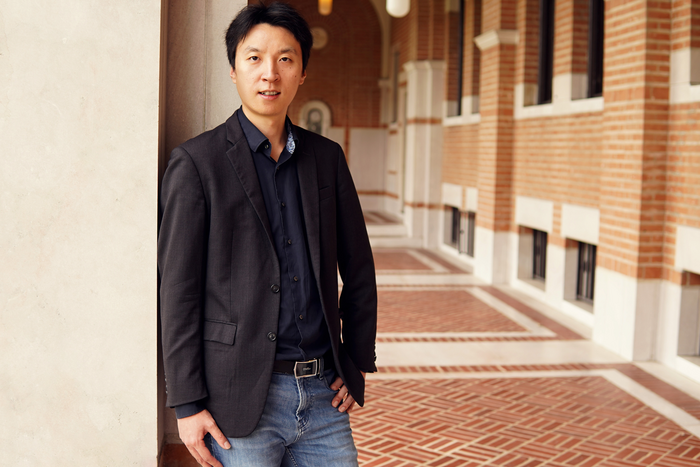HOUSTON – (Feb. 21, 2023) – Rice University’s Taiyun Chi has won a $500,000 National Science Foundation CAREER Award for research that will focus on two key areas: developing an implanted neural interface with neural recording channel counts more than 10 times higher than current state-of-the-art technology, and creating a noninvasive deep-brain-stimulation system based on temporally interfering electromagnetic waves.

Credit: Photo by Xaymara Garza/Rice University.
HOUSTON – (Feb. 21, 2023) – Rice University’s Taiyun Chi has won a $500,000 National Science Foundation CAREER Award for research that will focus on two key areas: developing an implanted neural interface with neural recording channel counts more than 10 times higher than current state-of-the-art technology, and creating a noninvasive deep-brain-stimulation system based on temporally interfering electromagnetic waves.
Neural interfaces serve as powerful tools for better understanding the brain and are increasingly utilized in clinical applications. For example, emerging brain-machine interfaces built on large-scale neural recording can decipher brain activities; the decoded information can then be used to control neural prosthetics to restore lost sensory or motor functions for paralyzed patients. On the neural stimulation side, deep brain stimulation has proven to be highly effective in treating certain disorders by injecting a pulsed current with a predefined pattern.
“Although these results are highly encouraging, to fully unlock the potential of neural interfaces for future widespread and standard-of-care human clinical use, new device capabilities need to be developed with significantly improved hardware performance,” said Chi, an assistant professor in Rice’s Department of Electrical and Computer Engineering.
“The goal of this research project is to impact the key designs in future brain-machine interfaces, neural prostheses and the treatment of brain disorders,” he said.
The highly competitive, five-year CAREER grants are given to early-career faculty members who demonstrate potential to serve as academic models and leaders in research and education. The NSF gives about 500 such awards across all disciplines each year.
There are two research tasks in Chi’s project. The first is to develop a fully packaged implantable neural interface consisting of a low-power, application-specific integrated circuit (ASIC), a flexible neural probe and a high-speed digital back end that relays data from the ASIC to a computer for real-time processing. The second is to develop a noninvasive deep-brain-stimulation system, including its multi-physics modeling, stimulation hardware implementation and experimental validation.
Chi received a doctorate from the Georgia Institute of Technology in 2017 and a bachelor’s degree from the University of Science and Technology of China in 2012.
He joined Rice as assistant professor in 2019 and currently directs the Rice Integrated Systems and Electromagnetics (RISE) Lab. His research group focuses on developing high-performance integrated circuits and microsystems to advance hardware platforms for high-speed wireless communication, sensing and neuroengineering applications. In the past two years, the group has won the 2021 Institute of Electrical and Electronics Engineers (IEEE) Custom Integrated Circuits Conference Best Student Paper Award and the 2021 Texas Wireless Symposium Student Research Competition Award, and was a finalist for the 2022 IEEE Radio Frequency Integrated Circuits Symposium Best Student Paper Award and the 2021 IEEE International Microwave Symposium Advanced Practice Paper Award.
-30-
This news release can be found online at news.rice.edu.
Follow Rice News and Media Relations via Twitter @RiceUNews.
CAREER Award abstract:
https://www.nsf.gov/awardsearch/showAward?AWD_ID=2238833&HistoricalAwards=false
Author info:
Xaymara Garza is global marketing manager in the Department of Electrical and Computer Engineering at Rice University.
Image downloads:
https://news-network.rice.edu/news/files/2023/02/2302_Chi_NSFCAREER.jpg
CAPTION: Taiyun Chi is an assistant professor of electrical and computer engineering at Rice University.
Related stories:
Kory Evans wins NSF CAREER Award:
https://news.rice.edu/news/2023/kory-evans-wins-nsf-career-award
Evelyn Tang wins CAREER Award:
https://news.rice.edu/news/2022/evelyn-tang-wins-career-award
Three NSF grants support future of wireless:
https://news.rice.edu/news/2022/three-nsf-grants-support-future-wireless
Links:
Rice Integrated Systems and Electromagnetics Lab (Chi group): https://chilab.info
Department of Electrical and Computer Engineering: https://eceweb.rice.edu
Located on a 300-acre forested campus in Houston, Rice University is consistently ranked among the nation’s top 20 universities by U.S. News & World Report. Rice has highly respected schools of Architecture, Business, Continuing Studies, Engineering, Humanities, Music, Natural Sciences and Social Sciences and is home to the Baker Institute for Public Policy. With 4,552 undergraduates and 3,998 graduate students, Rice’s undergraduate student-to-faculty ratio is just under 6-to-1. Its residential college system builds close-knit communities and lifelong friendships, just one reason why Rice is ranked No. 1 for lots of race/class interaction and No. 1 for quality of life by the Princeton Review. Rice is also rated as a best value among private universities by Kiplinger’s Personal Finance.



